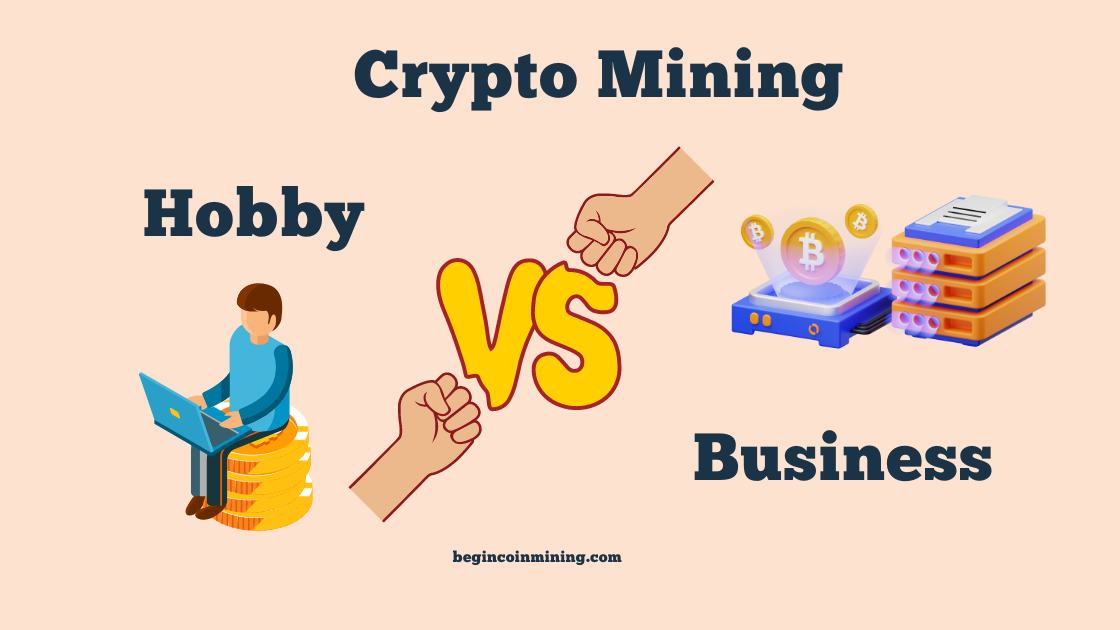Identify whether you are mining crypto as hobby or business for better structure your tax reporting purposes and get the maximum mining profitability.
The IRS and other government regulators are now considering taxing cryptocurrency miners due to the rising popularity of cryptocurrencies. Crypto miners may choose to treat their activities as a hobby or a business. While treating mining as a hobby may appear to be simpler on the surface, doing so has more advantages and benefits, which could lower your overall tax liability. The key is determining if the added complexity of owning a company is worth the tax savings.
The legal difference between a hobby and a business depends on subjective factors like:
- the time and energy invested.
- Your desire to gain money.
- Your reliance on mining profits.
- Your mining’s financial success.
If you’re trying out small-scale crypto mining on your personal computer, you should treat it as a hobby for tax purposes. On the other hand, you should treat it as a business and deduct some of your crypto mining taxes if you own your own rack server and depend on the income.
Is Crypto Mining Taxed?
The IRS is cracking down on crypto tax evasion and dedicating more resources toward enforcement, so it’s essential to stay on the right side of the law and pay what you owe. Even though the agency’s advice is far from definitive, its advice on cryptocurrency mining has been unambiguous since its initial input in 2014.
According to IRS Notice 2014-21:
If a taxpayer’s “mining” of virtual currency constitutes a trade or business, and the “mining” activity isn’t undertaken by the taxpayer as an employee, the net earnings from self-employment (generally, gross income derived from carrying on a trade or business less allowable deductions) resulting from those activities constitute self-employment income and are subject to self-employment tax.
The IRS also provided subsequent guidance to answer questions related to hard forks, airdrops, and other events that may occur when miners continue to hold cryptocurrencies in its Frequently Asked Questions on Virtual Currency Transactions. The more uncertain areas of the law apply to things like decentralized finance (DeFi) and non-fungible tokens (NFTs).
Read More: How to Report Bitcoin Mining Taxes
Mining as a Hobby
According to the IRS, hobby income is considered ordinary income and is therefore subject to your individual marginal tax rate. These tax rates are determined by your total amount of taxable income from work, investments, and other sources. The majority of that income is directly taxable because there are only a few deductions that you might be able to claim for a hobby business.
Your mining activity is a hobby you may still need to pay tax when you:
- receive your cryptoassets if they are ordinary income from providing a service
- sell your cryptoassets if you mined them for the purpose of selling them.
To report ordinary income from mining as a hobby, the taxpayer will report the amount received as income on Form 1040 Schedule 1. If the taxpayer chooses to itemize their deductions on their tax return rather than take the standard deduction, they are allowed to deduct expenses up at a maximum amount of 2% of their adjusted gross income on Schedule A. This 2% deduction is available for all itemized costs incurred by the taxpayer during the tax year, including those associated with virtual mining.
Mining as a Business
Business income is treated separately from ordinary income (e.g., income from wages or investments). The ability to deduct numerous business-related expenses is by far the biggest benefit of starting a business (see below). However, fees like computing resources and office space must be used exclusively for crypto mining to qualify for a deduction.
The high-level process for calculating business income is:
- Calculate your revenue by multiplying the daily mining output by the price at which it would trade on a reputable exchange, then totaling your annual earnings.
- Add up any additional electricity bills, server rental fees, and any other variable costs related to cryptocurrency mining to determine your variable expenses.
- List your allowable business costs, like server hardware, and depreciate them over time to determine your fixed expenses.
- In order to calculate net income, subtract revenue from expenses. This figure is reported on your corporate tax return or Form 1040 Schedule C.
See IRS Publication 334 Chapter 10 for more details on what counts as a business expense. And again, it’s worth speaking to a tax professional that can help give you a definitive answer that’s defensible in the event of an audit.
How to Set-up a Crypto Mining Business
A sole proprietorship is the most basic form of cryptocurrency mining company. Any income earned by the business is passed through and added to your income from Form 1040 Schedule C. The only drawback is that since sole proprietorships are not protected by corporations, your assets may be at risk if your business is sued and you are unable to pay your debts.
There are a few different ways to structure a business (although this list is not all-inclusive):
- Limited Liability Company (LLC) – The LLC designation establishes a distinct entity for your company’s assets. You can add an LLC to a sole proprietorship or partnership.
- S-Corporation – S-Corps are corporations with pass-through tax status, which means that the revenue from your cryptocurrency mining is only taxed once at the individual level.
- C-Corporation – C-Corps are conventional corporations that have their own taxes. They must pay corporate taxes, and any dividends or wages could be subject to personal taxes.
If you receive payment from these organizations in cryptocurrencies, you must treat it as compensation. As a result, you must determine your income by deducting the fair market value of the coins, and then use the aforementioned ordinary income marginal tax bracket to determine your tax liability. You may, however, in some circumstances receive dividends or distributions at a reduced tax rate.
If you pay others more than $600 as part of business, you are also required to report the payment to the IRS and send the recipient a 1099-MISC form. If someone contracts your company as a subcontractor, the opposite is accurate. These forms are designed to ensure that you or your contracts pay tax on any significant income.
Bottom Line: Structure Your Mining Plan
The growth of the crypto mining sector has increased the IRS’s attention to the taxes associated with it.
If you’re trying out small-scale crypto mining on your personal computer, you should treat it as a hobby for tax purposes. On the other hand, you should treat it as a business and deduct some of your crypto mining taxes if you own your own rack server and depend on the income.
If you’re mining cryptocurrencies as business, you should carefully consider how to structure your business, keep detailed records of all transactions and ensure that you’re following the rules to the “T.” In this manner, you can be sure that no one from the IRS will be at your door.
FAQs
Is Mining Crypto a Profitable Business?
As evidenced by a breakeven price of $7,000 to $9,000 for most of them for incremental hashrate output, the majority of the top mining companies have a relatively new fleet that can remain profitable at a much lower BTC price than current levels.
Read more: Is Bitcoin Mining Profitable
Is Crypto Mining at Home Worth It?
Bitcoin mining is still extremely profitable in 2022. Approximately $20 million worth of bitcoin are currently being mined daily by bitcoin miners. That amounts to $600 million each month. Since a mining machine can cost between $2,000 and $20,000, only experienced miners can mine.
Can the IRS Track Crypto Mining?
Yes. Any time you receive a 1099 form – the IRS receives an identical copy. Therefore, if you fail to report your transactions related to a specific 1099 form, the IRS will be aware of it.
How Does IRS Know Your Mining Crypto?
To start with, some crypto exchanges send Form 1099 to IRS, alerting the agency that a taxpayer has been trading cryptocurrency. The taxpayer will probably be required to report cryptocurrency on their tax returns. As for virtual currencies, the IRS added a question about them to Form 1040 for the first time in 2019.










